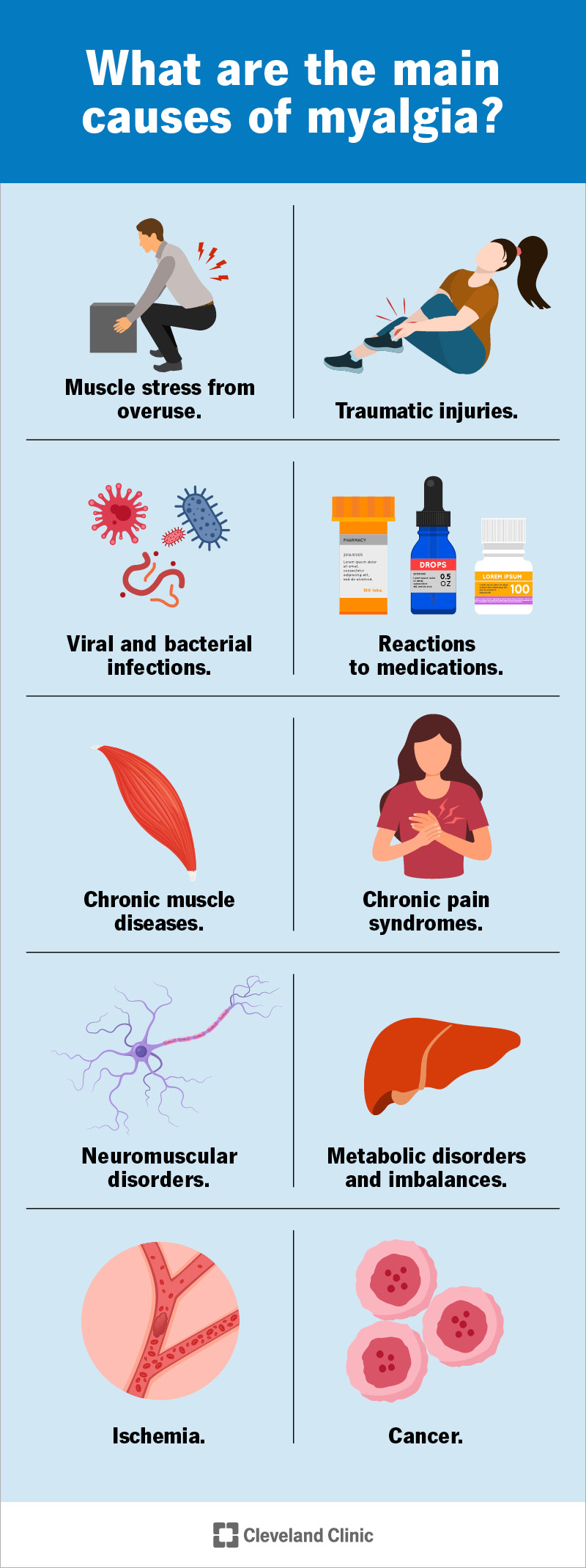Myalgia is the medical term for muscle pain, which has many causes. Many of them are easy to treat at home. But myalgia can also be a symptom of disease, especially when it’s widespread and long-lasting. It’s important to take your pain seriously. If it’s not improving as it should be, you might need medical attention.
Advertisement
Cleveland Clinic is a non-profit academic medical center. Advertising on our site helps support our mission. We do not endorse non-Cleveland Clinic products or services. Policy

Image content: This image is available to view online.
View image online (https://my.clevelandclinic.org/-/scassets/images/org/health/articles/myalgia-muscle-pain-infographic)
Myalgia means muscle pain — something we’ve all felt at one time or another. Sore muscles and body aches are common after exercise and when you have the flu. Myalgia is usually temporary and not serious. But sometimes, it can be a sign of a long-term condition that needs your attention. If you don’t know why your muscles hurt or they don’t seem to be getting better, see a healthcare provider about it.
Advertisement
Cleveland Clinic is a non-profit academic medical center. Advertising on our site helps support our mission. We do not endorse non-Cleveland Clinic products or services. Policy
Healthcare providers often begin by classifying myalgia as either localized (in one spot) or diffuse (all over). This can help narrow down the possible causes. Localized muscle pain or soreness in one spot is more likely to be related to an event, like an injury or recent stress on that muscle group. Diffuse, all-over body aches are more likely to be related to something affecting your whole body, like a disease.
To narrow it down further and help determine how serious your myalgia is, your provider may ask:
All sorts of things can cause myalgia. Some of the main types of causes include:
Advertisement
Muscle pain from temporary causes, like exercise, strain or a passing infection, will usually improve with rest and home care. But if soreness persists for more than a few days, or worsens despite rest, this could be a sign of a more serious issue that requires professional care. Call your provider if your pain doesn’t improve. You might need medications, physical therapy or even a procedure to treat some conditions.
Muscle soreness after exercise is common, especially after trying something new. You may get sore muscles right away (acute soreness), or it may set in a day or two later (delayed-onset muscle soreness). On the flip side, you may have pain from not moving enough, or from only using some muscles and not others. For example, desk jobs involving long hours of sitting can cause muscle stiffness and pain.
Self-care for everyday muscle aches and pains can include:
Contact a healthcare provider about myalgia if:
Muscle pain is common, whether it’s the all-over body aches that come with the flu or the sore muscles you get after a long hike. It’s not always a bad thing: Muscle soreness after exercise is part of the process of building stronger muscles. But it’s important to notice when muscle pain is more severe or longer lasting than it should be. If home care doesn’t relieve your myalgia, you might need medical care.
Advertisement

Sign up for our Health Essentials emails for expert guidance on nutrition, fitness, sleep, skin care and more.
Learn more about the Health Library and our editorial process.
Cleveland Clinic’s health articles are based on evidence-backed information and review by medical professionals to ensure accuracy, reliability and up-to-date clinical standards.
Cleveland Clinic’s health articles are based on evidence-backed information and review by medical professionals to ensure accuracy, reliability and up-to-date clinical standards.
Cleveland Clinic’s primary care providers offer lifelong medical care. From sinus infections and high blood pressure to preventive screening, we’re here for you.
